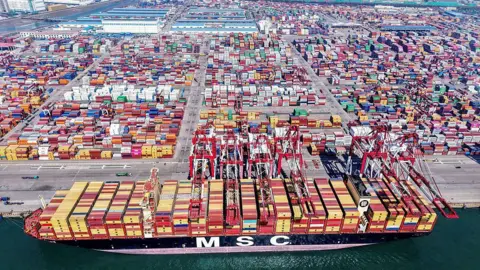China has recently made a compelling call to the United States, urging the cancellation of its extensive tariffs on Chinese imports. This request is rooted in the belief that such a move would demonstrate President Donald Trump’s earnestness in resolving the ongoing trade conflict between the two economic giants. Officials have pointed out that despite some claims from the Trump administration, no genuine trade talks have been occurring between the factions involved.
The ongoing trade war has intensified dramatically, underscored by China’s recent move to return Boeing aircraft that were originally ordered from the U.S. This represents a significant retaliatory action in response to the tariffs imposed by the U.S., aimed at reducing the trade deficit and protecting American industries. However, President Trump has recently hinted at a potential softening of his approach towards China, stating that while tariffs imposed on imports from China could be reduced substantially, they would not be eliminated completely.
A notable figure in this dialogue is He Yadong, the spokesperson for the Chinese Commerce Ministry, who recently articulated one of China’s firmest positions regarding the tariff dispute. He emphasized that the U.S. must remove all “unilateral tariff measures” against China to genuinely seek a resolution to the trade issues at hand. By stating, “The person who tied the bell must untie it,” he underscored the notion that the responsibility to dismantle the tariffs lies with the U.S. administration, which initiated these measures.
Another key spokesperson, Guo Jiakun from China’s Foreign Ministry, echoed the sentiments of his colleague by affirming that there have been no consultations or meaningful negotiations surrounding tariffs between the two nations. He further advised that reports suggesting otherwise were misleading and incorrect. This assertion came in the context of statements made by President Trump regarding the existence of “active” negotiations—claims which were subsequently undermined by U.S. Treasury Secretary Scott Bessent, who clarified that no formal discussions had commenced.
The U.S.-China trade relations are highly significant, not only for the two nations involved but for the global economy at large. As the world’s two largest economies, any tensions or disputes between them can have ripple effects on international trade and markets. Furthermore, the actions taken by both sides in this trade war exhibit a broader narrative of competitiveness, protectionism, and negotiation strategy that is becoming increasingly prevalent in global policymaking.
As of now, the stalemate continues, and the proactive approach suggested by Chinese officials appears to be critical if any progress is to be made. President Trump’s administration has to respond strategically in light of these developments. The stakes are especially high, considering the historical context of U.S.-China relations, where economic, political, and societal dynamics intertwine. Every dithering statement made by either party resonates through the corridors of financial markets and can abolish or ignite investor confidence.
In conclusion, while the path to resolving the trade issues is fraught with challenges, the clarion call from China for the U.S. to revoke tariffs presents a pivotal moment in the trade narrative. Both countries must engage in earnest dialogue to address the underlying concerns and navigate through these turbulent economic waters. As the international community observes the unfolding events, it will be critical for both nations to demonstrate leadership and willingness to compromise, which can ultimately lead to a more stable global economic environment.



